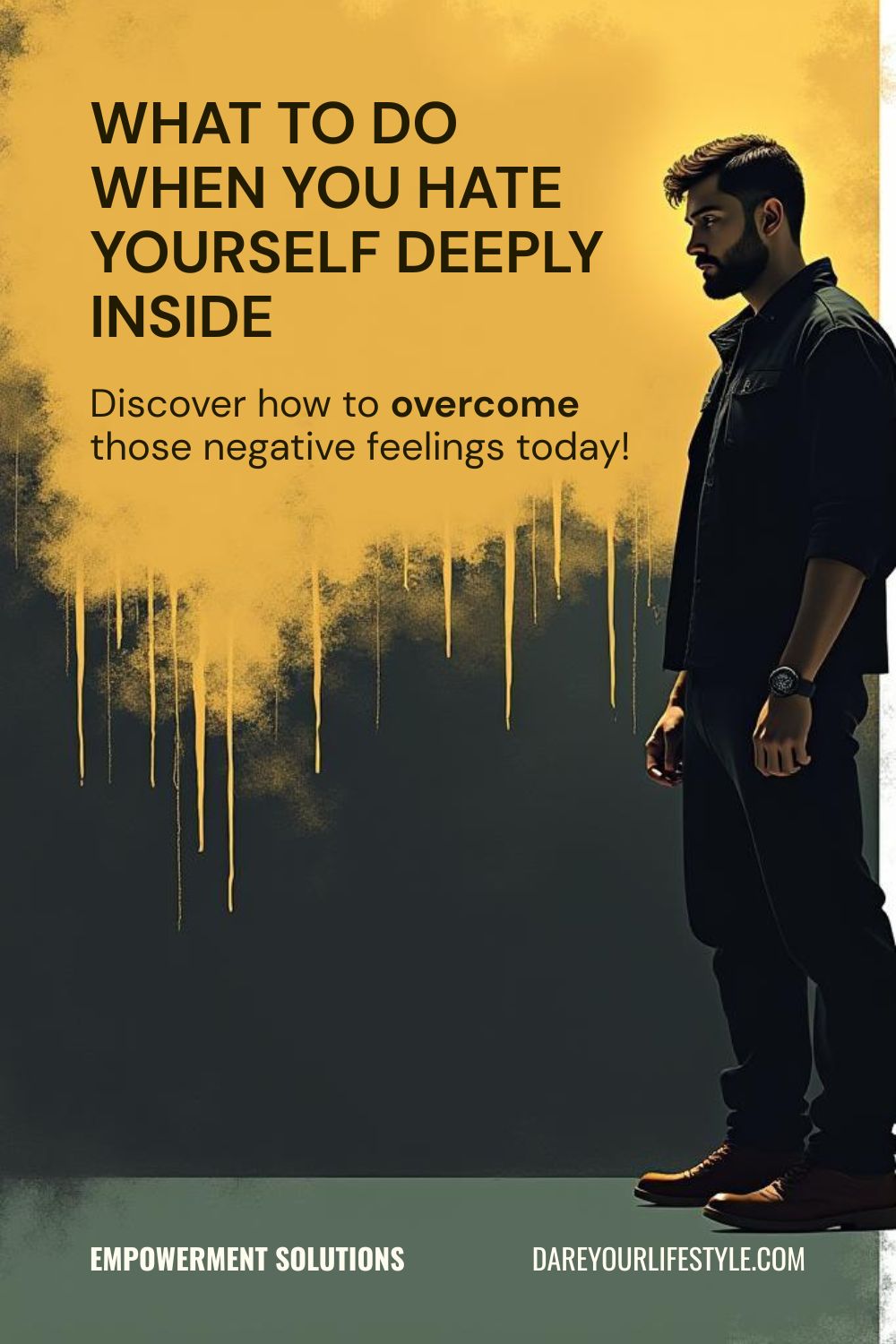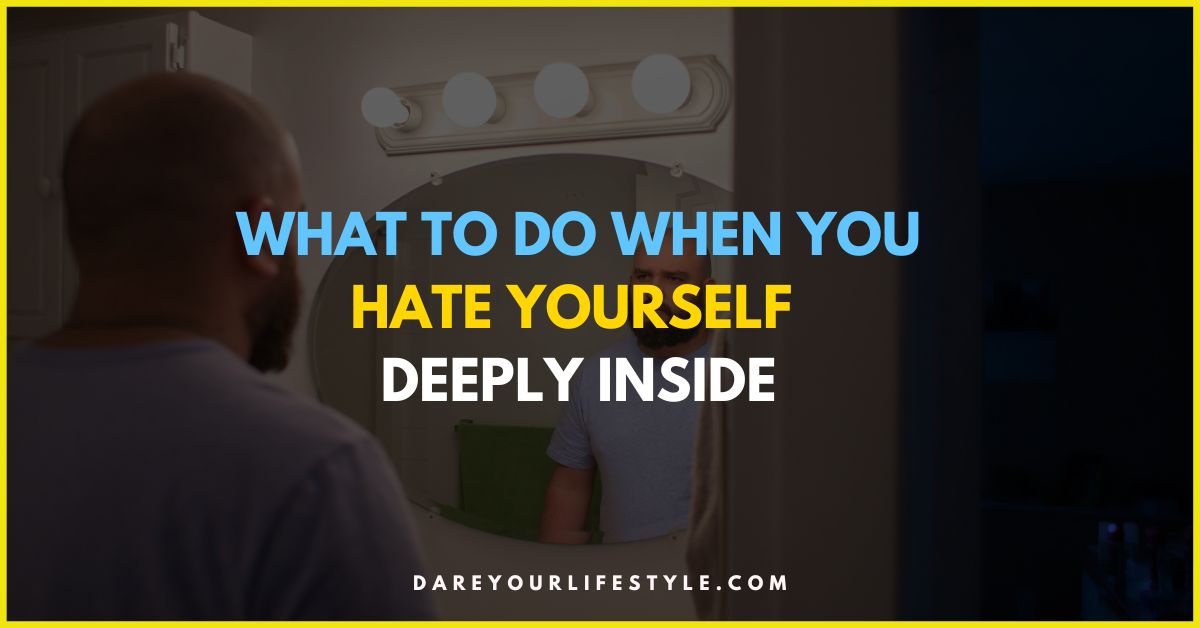Disclaimer: This post may contain affiliate links, meaning we get a small commission if you make a purchase through our link at no extra cost to you. For more information, please visit our Disclaimer Page.
Have you ever looked in the mirror and felt like you were staring at someone you couldn’t stand?
That heavy thought — the kind you don’t want to say out loud — is what makes what to do when you hate yourself a conversation most people avoid.
It’s easier to pretend than admit something feels that broken inside.
But hate doesn’t just show up — it builds from pain, silence, shame, and trying too hard for too long.
You don’t need a long lecture.
You need real answers that meet you in the middle of the mess.
In this post, we’ll walk through practical steps you can take when self-loathing feels louder than truth.
No sugar-coating, no fake motivation.
Just simple things to help you keep showing up — even when it feels like you’ve lost yourself.
Because you don’t have to stay in this place forever.
You can rebuild, even if it’s one shaky piece at a time.

Table of Contents
The Real Talk: What Hating Yourself Actually Looks Like
Before we jump into solutions, let’s call it what it is. Self-hatred isn’t just having a bad day or feeling a little down on yourself. It’s that persistent voice that tells you you’re not enough – not smart enough, not attractive enough, not successful enough. It’s the voice that takes every mistake and turns it into evidence of your fundamental flaws.
For me, it showed up as endless nights questioning my identity, my worth, my right to take up space in this world. Maybe for you it’s different – maybe it’s that constant comparison game, or the way you talk to yourself after every perceived failure.
The thing is, persistent self-hatred often points to deeper issues. It can be tied to depression, anxiety, past trauma, or just years of internalized criticism. But here’s what matters: it doesn’t have to be permanent.
Your Brain’s Biggest Lie: The Core Belief System
Here’s the thing your brain won’t tell you – most self-hatred comes from one massive lie: that you’re fundamentally flawed or unworthy. This core belief of self-hatred usually gets planted early. Maybe it was criticism from family, bullying at school, or just growing up in an environment where nothing you did felt good enough.
These beliefs become so automatic that you don’t even question them. They’re like background music in your head – always playing, always influencing how you see yourself and the world.
The first step? Calling BS on these beliefs. They’re not facts – they’re stories you’ve been telling yourself for so long that they feel real.
The Self-Hatred Playbook: Why Your Brain Does This
Your brain isn’t trying to torture you (even though it feels that way). Self-hatred often serves as a twisted form of protection. If you hate yourself first, maybe others can’t hurt you as much. If you expect the worst from yourself, disappointment stings less.
But here’s the plot twist – this protection mechanism is actually keeping you stuck. It’s like wearing armor that’s so heavy you can’t move.
Common triggers that fuel self-hatred:
- Perfectionism – Setting impossible standards then beating yourself up when you’re human
- Comparison trap – Using everyone else’s highlight reel to judge your behind-the-scenes
- Past mistakes – Carrying around guilt like it’s your job description
- Criticism sensitivity – Taking every piece of feedback as proof you’re not good enough
The Mental Health Connection: When Self-Hatred Runs Deeper
Let’s be real about something important: self-hatred and depression often go hand in hand. While hating yourself doesn’t automatically mean you’re depressed, it’s often a key symptom.
If you’re experiencing persistent sadness, loss of interest in things you used to enjoy, changes in sleep or appetite, or thoughts of self-harm, please reach out for professional help. Crisis Text Line offers free, confidential support 24/7.
Sometimes that weird feeling of “not being yourself” – like you’re watching your life from the outside – can be tied to depersonalization or anxiety. If this sounds familiar, you’re not losing your mind. It’s your brain’s way of coping with stress or trauma.
The Game-Changer: Building Self-Compassion (Not Self-Esteem)
Here’s where most advice gets it wrong. Everyone talks about building self-esteem, but what you really need is self-compassion. Self-esteem is about thinking you’re better than others. Self-compassion is about treating yourself like a human being who deserves kindness – especially when you mess up.
Think about how you’d talk to your best friend going through what you’re going through. You wouldn’t call them names or tell them they’re worthless, right? That’s the voice you need to turn inward.
The Self-Compassion Cheat Code:
- Notice the harsh self-talk – Catch yourself in the act
- Pause and acknowledge – “I’m being really hard on myself right now”
- Reframe with kindness – “What would I tell a friend in this situation?”
These are What to Do When You Hate Yourself
Challenge Your Inner Critic
Your inner critic is like that friend who always has something negative to say – except they live in your head rent-free. Time for an eviction notice.
When you catch yourself in negative self-talk:
- Question the evidence – Is this thought actually true, or is it just familiar?
- Look for alternatives – What else could be true about this situation?
- Use the friend test – Would you say this to someone you care about?
Improving your mental health starts with changing the conversation in your head.
Replace Harmful Habits with Life-Giving Ones
Self-hatred often comes with destructive coping mechanisms. Instead of fighting the urge, replace it with something better:
- Journaling – Get those thoughts out of your head and onto paper. Try these journal prompts for mental health
- Movement – Not because you hate your body, but because you want to feel strong
- Creative expression – Channel that energy into something beautiful
- Connection – Reach out to people who remind you of your worth
Practice Radical Self-Acceptance
This doesn’t mean settling or giving up on growth. It means accepting where you are right now while working toward where you want to be. Getting over regret and past mistakes is part of this process.
Use positive affirmations to build self-esteem – not the cheesy ones that make you cringe, but real, honest statements about your humanity and worth.
The Recovery Toolkit: Resources That Actually Help
Professional Support Options
Sometimes you need backup, and that’s not weakness – it’s wisdom. Cognitive Behavioral Therapy (CBT) has strong evidence for helping with self-hatred and depression. Emotion-focused therapy and guided self-help programs can also be game-changers.
Don’t wait until you’re in crisis to reach out. Think of therapy like going to the gym for your mind.
Daily Practices That Move the Needle
- Morning routine – Start your day with intention, not self-attack
- Gratitude practice – Find three things you’re grateful for, including one about yourself
- Boundary setting – Learn to say no to things that drain your energy
- Self-care rituals – Not bubble baths (unless that’s your thing), but real acts of self-respect
Check out this monthly reset routine checklist to build consistent practices that support your mental health.
When the Spiritual Side Matters
If you’re someone who draws strength from faith, you’re not alone in wondering about the spiritual aspect of self-hatred. Many faith traditions teach that self-love is actually a commandment, not a suggestion.
Biblical verses on self-esteem remind us that we’re created with inherent worth – not because of what we do, but because of who we are. Some theological perspectives consider persistent self-hatred problematic because it contradicts teachings about loving yourself and others.
If you’re struggling with guilt around self-care or self-compassion, remember: you can’t pour from an empty cup. Taking care of yourself isn’t selfish – it’s necessary.
Building Your Support Network
Recovery from self-hatred isn’t a solo journey. You need people in your corner who see your worth even when you can’t. This might include:
- Trusted friends or family who can offer perspective when you’re stuck
- Online communities where you can connect with others who understand
- Mental health professionals who can provide tools and guidance
- Spiritual advisors if faith is important to your healing
Don’t try to be strong all the time. Overcoming self-doubt often requires borrowing other people’s belief in you until you can rebuild your own.
The Long Game: What Recovery Actually Looks Like
Here’s the real talk: recovery from self-hatred isn’t linear. You’ll have good days and rough days. The goal isn’t to never have a negative thought about yourself again – it’s to change your relationship with those thoughts.
Success looks like:
- Catching negative self-talk sooner
- Bouncing back faster from setbacks
- Making decisions based on self-respect, not self-punishment
- Treating mistakes as learning opportunities, not character flaws
Getting your life together isn’t about perfection – it’s about progress.
Your Action Plan: Where to Start Today
- Right now: Take three deep breaths and say one kind thing to yourself
- Today: Notice one instance of harsh self-talk and reframe it
- This week: Identify one harmful habit and replace it with a nurturing one
- This month: Reach out for professional support or join a supportive community
Remember, ways to love yourself start with small, consistent actions. You don’t have to love yourself completely tomorrow – you just have to stop hating yourself today.
On a Final Note
Self-hatred feels permanent when you’re in it, but it’s not. It’s a learned pattern, which means it can be unlearned. You deserve the same compassion you’d show a friend, the same patience you’d give a child learning to walk, the same forgiveness you’d offer someone you love.
Those nights I spent questioning everything about myself? They taught me something important: the voice in your head that tells you you’re not enough is lying. It’s been lying for so long that you’ve started to believe it, but lies don’t become truth just because they’re repeated.
You are enough. Right now, as you are, with all your flaws and fears and failures. You’re enough, and you deserve to believe it.
If you’re ready to start this journey but don’t know where to begin, check out these journal prompts for mental health or explore ways to boost confidence that actually work.
The conversation in your head doesn’t have to be a battle. It can be a friendship. And that friendship? It starts with you deciding you’re worth the effort to change the story you’ve been telling yourself.
You’ve got this. Even when it doesn’t feel like it – especially when it doesn’t feel like it – you’ve got this.






